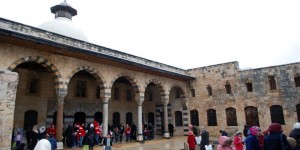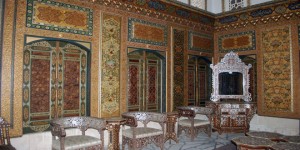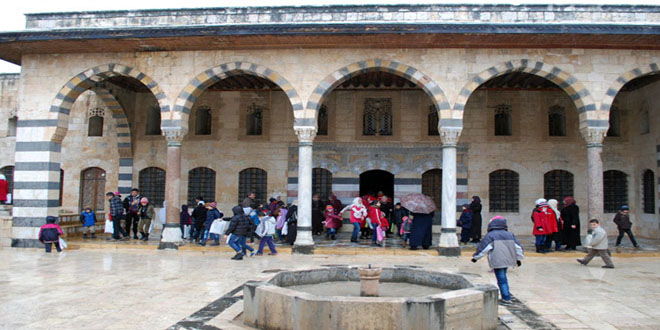Damascus, SANA- Al-Azem Palace in Hama is one of the most beautiful monuments overlooking the Orontes River, about 400 meters south of Hama Citadel, where it is decorated with inscriptions that makes Arab and western poets fascinated by its beauty such as Ross Burns, author of Monuments of Syria, who reportedly considers Al-Azem Palace to be “one of the loveliest Ottoman residential buildings in Syria”.
The Palace was built in 1742 by the Ottoman governor, As’ad Pasha al-Azem, as his residence, and it served the continuing line of Azem governors in Hama until the end of family rule in the 19th century, Head of Hama Architecture Directorate Seham Zakkar said.

In the era of Nasouh Pasha al-Azem, the palace turned from the governor house to be a house special for the Harem “women” called Haramlek.
The palace has been used as a museum since 1956, displaying archaeological findings from sites in and around Hama, including the citadel, Zakkar added, pointing out that a noteworthy exhibit is that of a Roman mosaic depicting a musician playing a lyre.
Al-Azm Palace in Hama has courtyards on each of its two floors, where the courtyard on the ground floor has a fountain in the middle and is decorated with trees planted to provide shade, and a liwan with three sides is located at one end, to provide seating for residents.
As for the courtyard on the second floor, its purpose is to make use of breezes and cool air, and there are stairs lead to the upper courtyard, where there is a grand reception room, protecting the facade is an arched portico, while every surface inside the building is decorated with painted woodwork, banded stonework, patterned marble, and a large dome is built above the central, Zakkar continued to say.
The other rooms inside are also decorated with both fountains and painted panels of birds and trees.In addition, the rooms that open into the upper courtyard contain “popular tradition” displays, with costumed mannequins depicting everyday scenes of Syrian life , and close to the entrance area is the Azem Palace’s private Hamaam “bath”. However, the hamaam seems to have been available for use by the public.
The smaller courtyard at the lower floor served as the haramlek, or family and women’s quarters. 
Burns says that the haramlek is particularly noteworthy.The palace has a single-floor guest wing on the western side, vaulted service quarters on the eastern side, and the second floor was the family residence , as there is a direct entrance to the Madafa (guest room) and the southern liwan, which also gives passage to the service wing and the Aezm family tomb.
A larger palace with the same basic plan, also known as the Azem Palace, was built in Damascus by As’ad Pasha when he became governor of that city in 1743.
After opening Hama National Museum in 1999, the building of al-Azem palace was specialized to be a museum for the popular traditions.
Reem/Barry
 Syrian Arab News Agency S A N A
Syrian Arab News Agency S A N A

